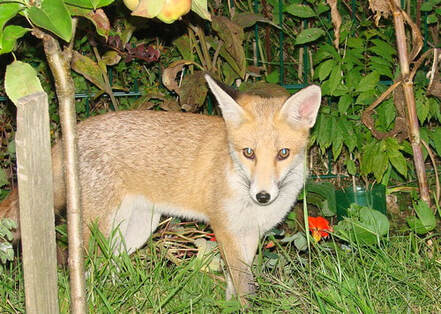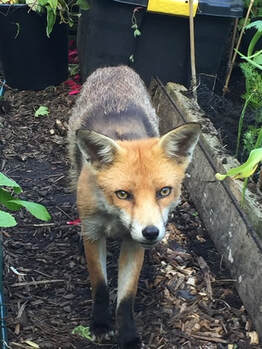Some Facts About Foxes

Foxes usually mate in January and will then dig out dens to provide a safe underground space used mostly for raising fox cubs.
In March one litter is born with 4 or 5 cubs of which only about 20% survive to breed. The vixen mother lies with them for 2-4 weeks and is usually fed by her mate and perhaps other vixens of the social group.
In April the cubs will emerge and will reach adult size by 6 months. From April onwards the cubs will be hidden in various places being fed and learning to hunt and fend for themselves.
By late August the cubs disperse to find their own new territory.
In March one litter is born with 4 or 5 cubs of which only about 20% survive to breed. The vixen mother lies with them for 2-4 weeks and is usually fed by her mate and perhaps other vixens of the social group.
In April the cubs will emerge and will reach adult size by 6 months. From April onwards the cubs will be hidden in various places being fed and learning to hunt and fend for themselves.
By late August the cubs disperse to find their own new territory.
If you are concerned about a fox having made a den on your allotment please do not block up the hole without knowing that it is unoccupied. This could result in the fox and cubs starving to death. The excavation will be short lived as the cubs grow up and disperse. Please contact the committee for advice. Better still, enjoy this unique opportunity to observe wildlife close up.
As there has been increased development of their natural rural habitat foxes have adapted successfully to urban and suburban life.
Foxes are usually scared of humans but have become more familiar with them in their search for food. They are attracted to our allotment as it is an excellent habitat for them to hunt for food and a safe place they may choose to make a den and rear their young.
They are omnivores and have a diverse diet dining on small mammals such as rabbits, voles and mice, birds, frogs, earthworms, berries and carrion. They are successful scavengers so look out if you leave your sandwiches unattended! They also enjoy peanuts and sunflower seeds!
Foxes cache their surplus food (burying it to consume later), hiding it fast before some other animal takes it and will return later to eat. They are not all fussy about sell-by dates, so you may find some buried prey on your plot that will still be eaten with relish - even better with maggots!
Foxes are very curious and always on the lookout for a snack so if you find one in your shed, leave the door open and it will flee as quickly as it can. Remember they are wild animals and need to maintain some fear to remain safe from humans that are not so fond of them.
Foxes can live in family groups of several adults, but are often solitary and generally lie up alone during the day, resting in a sheltered, secluded spot either above or below ground. They are most active during the hours of darkness and hunt and forage alone. You may stumble across one sleeping in a quiet sunny spot on your plot.
Foxes love to play, particularly with things that smell good – an old shoe, balls and gardening gloves are favourite items to go missing! Playing may also lead to disaster and fox cubs frequently get hung in garden netting or entangled in lengths of garden line left lying on the ground or injured on broken glass. It is always wise to check our netting frequently to check for wildlife caught up in it.
During the summer months foxes may look extremely scruffy and people often think they are mangy but they are moulting before growing a beautiful new coat.
Foxes can live as long as 12 years but sadly for urban foxes it is only 2-3 years or even less. Cars are mainly responsible for their deaths and injuries are common. If you find an injured animal please call SSPCA Animal Helpline 03000 999 999
As there has been increased development of their natural rural habitat foxes have adapted successfully to urban and suburban life.
Foxes are usually scared of humans but have become more familiar with them in their search for food. They are attracted to our allotment as it is an excellent habitat for them to hunt for food and a safe place they may choose to make a den and rear their young.
They are omnivores and have a diverse diet dining on small mammals such as rabbits, voles and mice, birds, frogs, earthworms, berries and carrion. They are successful scavengers so look out if you leave your sandwiches unattended! They also enjoy peanuts and sunflower seeds!
Foxes cache their surplus food (burying it to consume later), hiding it fast before some other animal takes it and will return later to eat. They are not all fussy about sell-by dates, so you may find some buried prey on your plot that will still be eaten with relish - even better with maggots!
Foxes are very curious and always on the lookout for a snack so if you find one in your shed, leave the door open and it will flee as quickly as it can. Remember they are wild animals and need to maintain some fear to remain safe from humans that are not so fond of them.
Foxes can live in family groups of several adults, but are often solitary and generally lie up alone during the day, resting in a sheltered, secluded spot either above or below ground. They are most active during the hours of darkness and hunt and forage alone. You may stumble across one sleeping in a quiet sunny spot on your plot.
Foxes love to play, particularly with things that smell good – an old shoe, balls and gardening gloves are favourite items to go missing! Playing may also lead to disaster and fox cubs frequently get hung in garden netting or entangled in lengths of garden line left lying on the ground or injured on broken glass. It is always wise to check our netting frequently to check for wildlife caught up in it.
During the summer months foxes may look extremely scruffy and people often think they are mangy but they are moulting before growing a beautiful new coat.
Foxes can live as long as 12 years but sadly for urban foxes it is only 2-3 years or even less. Cars are mainly responsible for their deaths and injuries are common. If you find an injured animal please call SSPCA Animal Helpline 03000 999 999

Foxes normally leave their cubs unattended and only return briefly to feed them. If you find cubs, do not assume that they are orphaned as there is no sign of the parents. If the cubs are lying quietly, they are undoubtedly being cared for; when they are hungry they will start making plaintive barking noises. If you think the cubs are deserted, do not touch them. If it is just a single cub that is found, it is much more likely that it has strayed and cannot find its way home to the rest of the litter. The plaintive barking is a contact call; do not touch the cub, keep an eye on it to ensure that it is safe from predators, and soon after dark the vixen will recover it.
We have always had foxes on our Inverleith allotment and we hope that you will enjoy them along with all the other amazing birds and creatures.
Let's continue to welcome them and make the allotment a safe place for all wildlife.
The longest living resident in my memory was a vixen who reached almost 9 years old - a ripe old age in the city!
We have always had foxes on our Inverleith allotment and we hope that you will enjoy them along with all the other amazing birds and creatures.
Let's continue to welcome them and make the allotment a safe place for all wildlife.
The longest living resident in my memory was a vixen who reached almost 9 years old - a ripe old age in the city!
